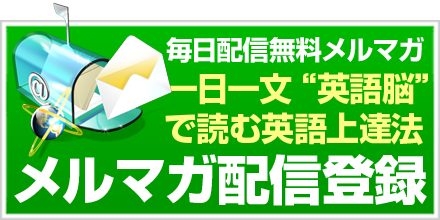今日も英語脳で英語を読む練習をしていきましょう!
一日一文“英語脳”で読む英語上達法
2025年8月22日(金)号
VOL.5981
本日の例文
The Economistより。『同志』という言葉が中国でカムバックするかも?という記事より
During Mao Zedong’s rule of China, it was common for people to address each other as tongzhi: “comrade”. But after Mao’s death in 1976, the term started to feel dated, and it was replaced by less ideological greetings. So it caused a stir when a mouthpiece for the Communist Party published an opinion piece this month calling for the word tongzhi to return to everyday speech.
今日の予習
■Mao Zedong
マオ・ツェ・ドン
毛沢東
□rule
音声
[ル]ーォ
支配、統治
■address ~ as …
~を…と呼ぶ
□comrade
音声
[カ]ム・ラドゥ
同僚、仲間、同志
□term
音声
[タ]ーム
言葉、用語
■feel dated
時代遅れの感じがする
□ideological
音声
イ・ディァ・[ロ]・ジ・コォ
イデオロギーの、思想的な
□greeting
音声
グ[リ]ー・ティング
あいさつ
■cause a stir
騒ぎを起こす、話題を呼ぶ、ざわめかせる
□stir
音声
ス[タ]ー
かき回すこと、動揺
□mouthpiece
音声
[マ]ウス・ピース
代弁人、スポークスマン
■the Communist Party
(中国)共産党
■opinion piece
意見記事、論説、社説
■call for ~
~を求める、~を要請する
※
引用元:“Comrade” is making a comeback in China – The Economist
https://www.economist.com/china/2025/07/24/comrade-is-making-a-comeback-in-china
https://www.instagram.com/p/DMgvR5HNd-t/
During Mao Zedong’s rule of China, it was common for people to address each other as tongzhi: “comrade”. But after Mao’s death in 1976, the term started to feel dated, and it was replaced by less ideological greetings. So it caused a stir when a mouthpiece for the Communist Party published an opinion piece this month calling for the word tongzhi to return to everyday speech.
で「毛沢東の中国統治時代には、人々が互いを『同志(tongzhi)』と呼び合うのが一般的だった。しかし1976年に毛沢東が死去した後、この語は時代遅れの印象を帯びるようになり、よりイデオロギー色の薄い挨拶表現に取って代わられた。そうした中、今月、中国共産党の代弁機関が発表したオピニオン記事が、『同志(tongzhi)』という言葉を日常会話に復活させようと呼びかけ、波紋を呼んでいる。」という意味になります。
During Mao Zedong’s rule of China, で「毛沢東の中国統治時代の期間」です。
毛沢東は Mao Zedong マオ・ツェドンと読みます。Mao Tse-tung とも表記されます。
it was common で「それは一般的だった」
for people to address ~ で「人々が~と呼ぶことが」です。
(to) address each other as tongzhi で「お互いを同志と呼び合うこと」です。
address ~ as … で「~を…と呼ぶ」です。
tongzhi: “comrade”. で「tongzhi つまり『同志』」です。
comrade [カ]ムラドゥで「同僚、同志、仲間」という意味です。
But ~「しかし~」
after Mao’s death in 1976,「1976年の毛沢東の死後」
the term started to feel dated,「その用語は、時代遅れに感じられ始めた」です。
the term は先程の tongzhi「同志」を指しています。
feel dated で「時代遅れに感じられる」です。
, and ~「そして~」
it was replaced by ~「それは~に置き換えられた」です。
replaced by ~ で「~に置き換えられる、取って代わられる」です。
(by) less ideological greetings.「より思想的ではないあいさつ(に)」
ideological で「思想色の強い」です。
名詞形は ideology イディ[ア]ラジ「イデオロギー、価値体系、信条、観念形態」という意味です。
例:far-left ideology「極左思想」
So ~「そういうわけなので~」
it caused a stir で「それは物議を醸した」です。
cause a stir で「騒ぎを起こす、物議を醸す」です。
stir スターは「かき混ぜること、混乱、動揺」です。
when a mouthpiece for the Communist Party published ~ で「中国共産党の代弁機関が~を発表した時」です。
mouthpiece はここでは「スポークスパーソン、渉外担当、代弁者、機関紙」です。
例:hire a mouthpiece「渉外担当者を雇う」
(published) an opinion piece で「意見記事を出した」です。
opinion piece は「(新聞の)意見記事、論説、社説」です。
文章や知らせ、記事などは piece で数えることから、piece で「記事」という意味になります。
例:a gossip piece「ゴシップ記事」、a piece of good news「良い知らせ、朗報」
this month「今月」
(an opinion piece) calling for the word tongzhi to return to everyday speech. で「その言葉『同志』が、日常会話に返り咲くことを呼びかける(意見記事)」です。
call for ~ で「~を求める、~を要求する」です。
さらに call for ~ to do … となって「~が…することを求める」となります。
それではまず文節に分けて日本語に訳し内容を理解して下さい。
During Mao Zedong’s rule of China,
毛沢東の中国統治時代の間
it was common
それは一般的だった
for people
人々が
to address each other
互いを~と呼び合うこと
as tongzhi: “comrade”.
同志(tongzhi)と
But
しかし
after Mao’s death in 1976,
1976年の毛沢東の死後
the term
その用語は
started to feel dated,
時代遅れに感じられ始めた
and it was replaced by
そしてそれは~に取って代わられた
less ideological greetings.
より思想色の弱いあいさつに
So
そういうわけなので
it caused a stir
それは騒ぎを起こした
when a mouthpiece for the Communist Party
中国共産党の機関紙が
published an opinion piece
意見記事を出したとき
this month
今月
calling for
~を要請する(記事を)
the word tongzhi
その言葉「同志」を
to return to everyday speech.
日常会話に戻ってくることを
今度は「頭の中で」一行ずつ日本語に訳しながら…
During Mao Zedong’s rule of China,
it was common
for people
to address each other
as tongzhi: “comrade”.
But
after Mao’s death in 1976,
the term
started to feel dated,
and it was replaced by
less ideological greetings.
So
it caused a stir
when a mouthpiece for the Communist Party
published an opinion piece
this month
calling for
the word tongzhi
to return to everyday speech.
次はいちいち日本語に訳さずに読んでみましょう。
During Mao Zedong’s rule of China,
it was common
for people
to address each other
as tongzhi: “comrade”.
But
after Mao’s death in 1976,
the term
started to feel dated,
and it was replaced by
less ideological greetings.
So
it caused a stir
when a mouthpiece for the Communist Party
published an opinion piece
this month
calling for
the word tongzhi
to return to everyday speech.
では最後に日本語に訳さずにこの文章の情景を思い浮かべられるようになるまで繰り返し読んでみてください。目を閉じて暗唱できるようになったら完璧です。
During Mao Zedong’s rule of China,
it was common
for people
to address each other
as tongzhi: “comrade”.
But
after Mao’s death in 1976,
the term
started to feel dated,
and it was replaced by
less ideological greetings.
So
it caused a stir
when a mouthpiece for the Communist Party
published an opinion piece
this month
calling for
the word tongzhi
to return to everyday speech.
Good job!
英語脳で読めましたね。今日も一歩、あなたはネイティブスピーカーに近づきました。おめでとう!
復習:日本語から英語を思い出してみましょう。
毛沢東の中国統治時代の間
それは一般的だった
人々が
互いを~と呼び合うこと
同志(tongzhi)と
しかし
1976年の毛沢東の死後
その用語は
時代遅れに感じられ始めた
そしてそれは~に取って代わられた
より思想色の弱いあいさつに
そういうわけなので
それは騒ぎを起こした
中国共産党の機関紙が
意見記事を出したとき
今月
~を要請する(記事を)
その言葉「同志」を
日常会話に戻ってくることを
今日のつぶやき
今日の学習メモ
★多読:
★スピーキング・リスニング:
某英会話カフェ
★ボキャビル:
instagram 英語系ショート動画
★その他:
初めて出会った言葉
mitch「学校をさぼる」
More power to you!「がんばれよ!」
毎日の継続が第一です。
それではまた明日!
メルマガ/フェイスブック/twitterでも毎日購読できます。
http://www.eigonou.net/mailmagazine/
http://www.facebook.com/eigonounet
https://twitter.com/eigonounet
是非ご参加ください!
みんなの英語学習法
http://www.eigonou.net/category/toukoumethod/
英語脳とは…
http://www.eigonou.net/
バックナンバー
http://www.eigonou.net/backnumber/
編集:こばやし
メルマガバックナンバー検索
全メルマガ記事6148件
The Japan Times Alpha(ジャパンタイムズアルファ) あらゆるレベルの人に購読をオススメする英字新聞です



コメントを残す